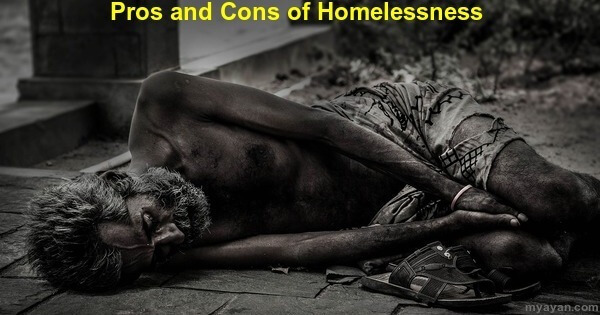The American homeless population has been shooting, especially after the pandemic, soon after the aid dried up. According to the National Alliance to End Homelessness, there were approximately 421,400 individuals experiencing homelessness in the US last year. Out of this number, 127,750 were classified as chronically homeless, indicating they had been without a stable place to live for a year or longer. The numbers are higher in the West of the US due to steadily increasing prices and rent of houses. Veterans and migrants make the most of the homeless population. Some are rendered homeless, while some decide to live that way. Homelessness has both pros and cons, given that it is a difficult lifestyle to lead.
Being homeless is not a choice but a last resort for many. However, if someone cannot make enough money to make a living, they can live as a homeless. There are many pros of homelessness, which include:
People living on the streets do not have to worry about paying bills, taxes, or other responsibilities that come with owning a home. They are free from all these mundane tasks and can live freely as they wish.
People experiencing homelessness are free from money worries since they do not possess anything of monetary value. Hence, there is no pressure on debts or loans, nor do they need to worry about maintenance costs.
Homeless people can move around freely without any restrictions and live in whichever place they want. They do not need the permission of anyone since there is no one overseeing their movement or activities.
One of the greatest advantages of homelessness is that people can appreciate nature and live closer to it. They have access to parks, gardens, and other green spaces which they can enjoy without worrying about outdoor upkeep costs.
People on the streets often come together and create communities, which is something very hard to find in urban life. The lack of personal safety nets also creates a sense of camaraderie among them.
Homelessness may have certain pros, but it is not an ideal lifestyle by any means, as it has many drawbacks. The cons of homelessness include:
The homeless lack access to basic needs such as food, clothing, and shelter, which are essential for any human being to live an optimum life. They do not have regular access to water and sanitation facilities or health care services in some cases.
Homeless people lack security since they don’t have a fixed place to live and are vulnerable to many risks while living on the streets. They can easily become targets of violence, theft, or other crimes due to their vulnerability.
One of the major cons of homelessness is poor health conditions. Homeless people are prone to various diseases due to the lack of proper hygiene and nutrition and have less access to medical care when needed.
You seldom see people treating the homeless with respect. Homelessness comes with a stigma attached in many societies, which makes life harder for them. People who are homeless often find themselves rejected by society as they are not seen as respectable individuals.
Homeless people must tolerate unbearable weather conditions and face many other difficulties, such as finding shelter during rain, extreme cold, or heat without any protection. A homeless person is always at the mercy of nature and can face many hardships.
Homelessness has and always will be a great concern ion the USA, marked by many highs and lows. In some places worldwide, several factors can contribute to homelessness, including poverty, discrimination, mental illnesses, drug abuse, or lack of affordable housing.
On the other hand, much good comes from homelessness, such as increased awareness about underlying issues in our society and inspiring initiatives like donating clothes or meals for the homeless population.
Societies must be diligent in our efforts to tackle the problem of homelessness if we want to make any long-term changes. Organizations like homeless shelters have become an essential part of this effort, and their stakeholders should be consistently supported to continue making a difference in countless people’s lives every day.
Moreover, it is important to understand both the pros and cons of homelessness, as this will holistically increase our perceptions of homelessness. We cannot simply ignore this problem – we must continually work on pushing for more legislation and initiatives to help those living without shelter.

Individuals experiencing homelessness face significantly higher rates of illness and, tragically, have an average life expectancy 12 years shorter than that of the general U.S. population. Merely lacking a home exposes them to hazardous health conditions, exacerbating larger issues such as infections and pneumonia.
Research indicates that individuals who experience homelessness may develop mental health issues for the first time, and existing behavioral health challenges can be exacerbated. Prolonged periods without a home are associated with heightened levels of mental distress and increased harm from coping mechanisms such as substance abuse.
Access to food is of utmost importance for individuals experiencing homelessness. Not only is it readily accessible, requiring no specific expertise or training, but it also serves as a basic necessity. By ensuring the availability of food and offering it free of charge, we can significantly impact supporting those in need.
There are additional reasons why people choose homelessness, such as having more freedom and time to work towards their goals, the opportunity to save money, live closer to nature, and escape from family. In essence, individuals opt for homelessness to gain greater autonomy and allocate more time to pursue their aspirations.